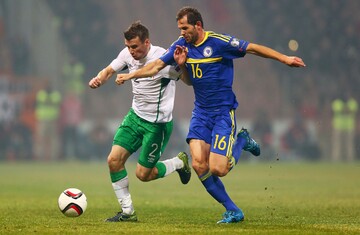1. Should the game have been postponed?
THERE WERE SLIGHTLY surreal, eerie scenes at the Bilino Polja Stadium in Zenica this evening.
After half-time, play became difficult if not impossible to see at times for spectators and players alike — the atmosphere quelled as fans were engaged in discussions with one another instead of watching a game they were struggling to see.
In fact, both Martin O’Neill and Robbie Brady himself admitted they barely saw the latter’s goal.
There were suggestions that the match could be abandoned, with the remaining minutes taking place on Saturday, but in the end, the referee was happy for play to continue to the end of the match.
Ireland certainly won’t complain, given that they achieved a relatively positive result, but when the players themselves could barely see what was happening, it seems legitimate to ask why action wasn’t taken.
Given the tight schedule these play-offs must adhere to, it was easy to understand why officials would be reluctant to call the game off given the logistical nightmare such a decision would likely cause, but with the game clearly impacted upon, would Uefa have a leg to stand on if either team registered a post-match complaint?
2. Brady comes of age
Tonight might well be remembered as the night Robbie Brady truly announced himself on the international scene.
Brady has been impressing at Carrow Road since signing for Norwich in the summer, and the 23-year-old is now starting to become a key player for Ireland.
The Dubliner certainly stepped up this evening, scoring Ireland’s vital away goal with a fantastic strike out of nothing to give Ireland the lead amid a tight game in Zenica.
While the winger has been inconsistent during this campaign, putting in a disappointing performance against Poland last month and also looking shaky at left-back against the same opposition at the Aviva, he has shown enough in recent matches to suggest he could be a mainstay of this team for years to come, boasting a level of creativity and wit that is all too rare in Irish football these days.
Of course, Brady is not the finished product at this point, but at 23, he represents the future in an Irish squad conspicuously short of young talent.
3. Hoolahan too advanced
Wes Hoolahan gave possibly his worst performance of the campaign for Ireland tonight, but it was hard not to sympathise with the Norwich midfielder to a degree.
He found it difficult to get in the game, and on the rare occasions when he did get the ball, the Norwich star struggled to keep hold of it.
It was consequently hardly a surprise when Hoolahan was replaced on the hour mark by the much stronger and faster James McClean.
Part of the problem was that Hoolahan was in a much too advanced position — he was virtually a striker at times and therefore seldom influenced the play as he can, with both himself and Daryl Murphy isolated in attack as the rest of the team toiled away without the ball for sustained periods.
4. Bosnia disappoint
There was a strange reaction by many Irish football fans in relation to their perception of Bosnia.
Initially, the Euro 2016 play-offs draw was greeted relatively positively, perhaps owing to the avoidance of Zlatan Ibrahimovich’s Sweden and Ukraine — a notoriously difficult place to travel to.
Yet soon, the thought of Ireland coming up against Pjanic and Dzeko, the worsening injury crisis for Martin O’Neill’s side and the story of Bosnia’s improving fortunes as their qualification campaign developed left many Irish fans feeling deeply pessimistic about their team’s chances.
But anyone who watched Bosnia’s recent defeat of Wales will have noticed a hard-working but plainly limited team who were hardly considerably superior to Ireland in ability — and tonight, Dzeko and co rarely opened up the Boys in Green and perhaps gave indications as to why they struggled in the group stages in the first place.
5. Ireland’s replacements show what they’re made of
In the build up to Friday’s match, Ireland’s situation tonight was compared to their rugby-playing counterparts, who were knocked out of the World Cup against Argentina after losing a number of key players.
Similarly, Ireland went into this evening’s match missing important players, including the injured John O’Shea and Shane Long, and the suspended Jon Walters.
Yet a makeshift backline featuring a player from the Championship (Richard Keogh) and a footballer earning just his 13th cap (Ciaran Clark) who has played just twice in the Premier League since August.
Yet — aside from one costly lapse in concentration by James McClean — the defence coped admirably, with Clark and Keogh in particular producing superb displays. It may not have been pretty, but thanks to these largely unheralded players, it’s advantage Ireland going into Monday’s second leg.









Man, I can’t even think of the football tonight. Life’s so unfair sometimes ffs.
I agree pal. R.I.P to all the people killed in France today.
The game should not have been postponed, sure we have to play again on Monday, if we played again today it would have ruined our preparation.
and rruined Bosnia’s as well